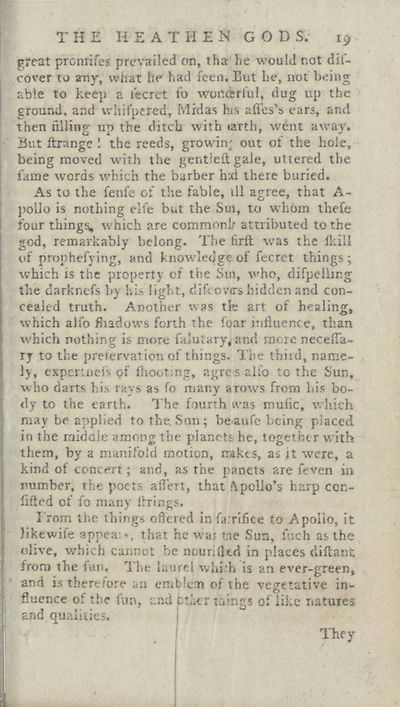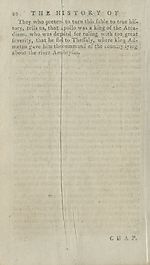Curiosities & wonders > History of the heathen gods and heroes of antiquity, very necessary for understanding the writings of the ancients, and the modern English poets
(25)
Download files
Complete book:
Individual page:
Thumbnail gallery: Grid view | List view

THE HEATHEN GODS. i9
great proimfes prevailed on, tha he would not dif-
cover to any, what he had feen. But he, not being
I able to keep a lecret io wonterlul, dug up the
| ground, and whilpcred, Midas his afles’s cars, and
then filling up the ditch with <arth, went away.
But ftrange ! the reeds, growin; out ot the hole,
being moved with the gentleft gale, uttered the
fame words which the barber hid there buried.
As to the fenfe of the fable, ill agree, that A-
pollo is nothing elfe but the Sui, to whom thefe
four things, svhich are commonh attributed to the
god, remarkably belong. The tirft was the fliill
of prophefying, and knowledge of fecret things;
which is the property of the Sm, who, difpellmg
the darkncfs by hi.-> light, difcovcs hidden and con¬
cealed truth. Another was tie art of healing,
which alfo fhadows forth the foar influence, than
which nothing is more falutary.and mere necefla-
ry to the pretervation of things. The third, name¬
ly, expertneis of (hooting, agre s alfo to the Sun,
who darts his rays as lb many arows from his bo¬
dy to the earth. The fourth was mulic, which
| may be applied to the Sun; be aufe being placed,
in the midale among the planets he, together with
them, by a manifold motion, mikes, as it were, a
kind of concert ; and, as the panets are feven in
number, the poets aflert, that Apollo’s harp ccn-
fifted of fo many firings.
I rom the things oftered in fa.rifice to Apollo, it
likewile appea >, that he was me Sun, fuch as the
olive, which cannot be noun (ltd in places diftant
from the fun. The laurel whi:h is an ever-green,
and is therefore an emblem of the vegetative in¬
fluence of the fun, and btlier Mings of like natures
and qualities.
They
great proimfes prevailed on, tha he would not dif-
cover to any, what he had feen. But he, not being
I able to keep a lecret io wonterlul, dug up the
| ground, and whilpcred, Midas his afles’s cars, and
then filling up the ditch with <arth, went away.
But ftrange ! the reeds, growin; out ot the hole,
being moved with the gentleft gale, uttered the
fame words which the barber hid there buried.
As to the fenfe of the fable, ill agree, that A-
pollo is nothing elfe but the Sui, to whom thefe
four things, svhich are commonh attributed to the
god, remarkably belong. The tirft was the fliill
of prophefying, and knowledge of fecret things;
which is the property of the Sm, who, difpellmg
the darkncfs by hi.-> light, difcovcs hidden and con¬
cealed truth. Another was tie art of healing,
which alfo fhadows forth the foar influence, than
which nothing is more falutary.and mere necefla-
ry to the pretervation of things. The third, name¬
ly, expertneis of (hooting, agre s alfo to the Sun,
who darts his rays as lb many arows from his bo¬
dy to the earth. The fourth was mulic, which
| may be applied to the Sun; be aufe being placed,
in the midale among the planets he, together with
them, by a manifold motion, mikes, as it were, a
kind of concert ; and, as the panets are feven in
number, the poets aflert, that Apollo’s harp ccn-
fifted of fo many firings.
I rom the things oftered in fa.rifice to Apollo, it
likewile appea >, that he was me Sun, fuch as the
olive, which cannot be noun (ltd in places diftant
from the fun. The laurel whi:h is an ever-green,
and is therefore an emblem of the vegetative in¬
fluence of the fun, and btlier Mings of like natures
and qualities.
They
Set display mode to:
![]() Universal Viewer |
Universal Viewer | ![]() Mirador |
Large image | Transcription
Mirador |
Large image | Transcription
| Permanent URL | https://digital.nls.uk/107906361 |
|---|
| Description | Thousands of printed books from the Antiquarian Books of Scotland collection which dates from 1641 to the 1980s. The collection consists of 14,800 books which were published in Scotland or have a Scottish connection, e.g. through the author, printer or owner. Subjects covered include sport, education, diseases, adventure, occupations, Jacobites, politics and religion. Among the 29 languages represented are English, Gaelic, Italian, French, Russian and Swedish. |
|---|

